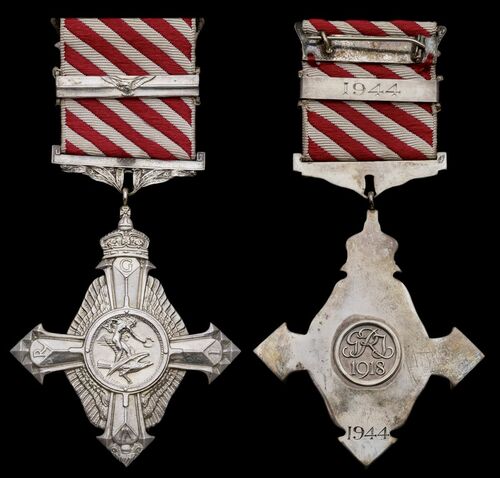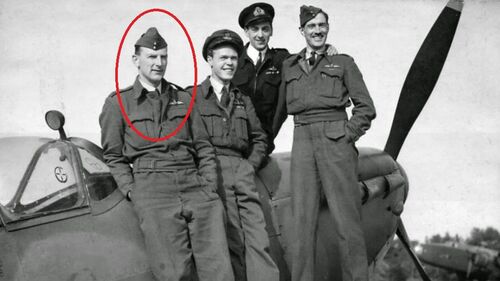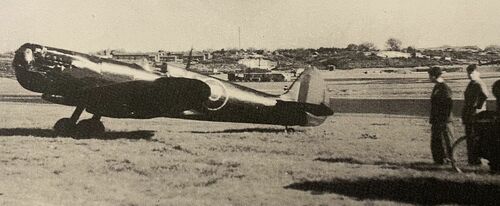Auction: 23001 - Orders, Decorations and Medals
Lot: 403
A very rare 1944 A.F.C. and Bar attributed to Wing Commander A. F. Martindale, Royal Air Force, for his gallant and highly-secret work as a Test Pilot
Having been presented with his first award for recording the record speed of 620mph in a hair-raising, high-altitude dive from some 37,000ft, the propeller broke off his Spitfire and it fell into a spin but Martindale kept cooly at the controls and made a perfect landing; he added further laurels - initially recommended for a George Medal - a few months later when in another high-altitude dive over London, on this occasion the engine burst into flames and he chose to stay at the controls to avoid his aircraft crashing into the Capital
Air Force Cross, G.VI.R., the reverse officially dated '1944', with Second Award Bar, the reverse officially dated '1944', mounted for wear upon its pin and in its case of issue, the inner of the case with details stuck in, good very fine
A.F.C. London Gazette 23 May 1944:
'This officer has rendered outstanding service as a Pilot during the last two years. On a recent flight the propeller and part of the engine broke off but Squadron Leader Martindale recovered control of the aircraft in circumstances of extreme difficulty and effected a perfect landing.'
Second Award Bar to A.F.C. London Gazette 28 November 1944. Although originally recommended for the award of the George Medal, a Bar to his A.F.C. was eventually promulgated:
'This officer has been engaged as a test Pilot in diving aircraft at high speeds. In the course of one such dive his aircraft had exceeded a speed of 600 m.p.h. when it caught fire. Realising that he was over the outskirts of a large town Squadron Leader Martindale remained at the controls and headed for open country. The fire died down and he decided to try and reach base although flames still came into the aircraft. Dense cloud obscured the base airfield and Squadron Leader Martindale was compelled to attempt a forced landing in a field. When making the approach to land, oil over his windscreen prevented this officer from seeing high tension cables directly in his path, until he was almost on them. He had no alternative but to crash in a wood. The aircraft burst into flames but Squadron Leader Martindale was able to get clear. After removing his parachute he returned to the burning aircraft, retrieved the recording apparatus and, although injured in the spine, kept onlookers clear until the local fire brigade arrived. This officer's courage in remaining at the controls undoubtedly saved lives and damage to property, whilst his bravery in returning to his aircraft made available the data recorded on this test.'
Anthony Featherstonehaugh Martindale was born on 25 October 1910 and was admitted to the Institution of Automobile Engineers in 1938. In 1939 he was a Pilot in the Royal Air Force Volunteer Reserve living at the De Havilland School of Flying.
With the outbreak of the Second World War he was put to good work as a high speed test Pilot of Allied and captured German aircraft. He wrote his name into the history books - and won his first A.F.C. - on 27 April 1944 when he recorded the highest confirmed dive speed in a piston-engined fighter. That day he was Pilot of Spitfire Mk.XI EN409 which topped 0.91 Mach (620mph at 27,000ft) but lost its propeller on the way down. Refusing to take to his parachute, he glided in and made a perfect landing. His Spitfire was even photographed after he had put it safely on the ground at Farnborough.
He added a Bar to his A.F.C. for a hair-raising flight on 16 September that same year, when undertaking a dive from 36,000ft. When at around 24,000ft and travelling at 603mph, the supercharger burst and set ablaze whilst the aircraft was on the outskirts of London (the location not having been disclosed in the published citation). He again showed cool bravery of the first order and managed to crash into some woods near Farnborough. It should be noted that he was originally put in for a George Medal. Upon reading the recommendation this award seems more fitting but probably due to the secret nature of his work, the Bar to the A.F.C. would have gone better 'under the radar'.
After the Second World War, Martindale became Chief Development Engineer for the Motor Car Division of Rolls Royce and died on 14 July 1959.
Sold together with the following original archive:
(i)
A letter, dated 21 October 1942, marked 'MOST SECRET', from Director W. S. Farren, thanking Martindale for his work in the U.P. Tactical Trials, which earned him a letter of commendation.
(ii)
Telegram confirming the award of the A.F.C.
(iii)
Telegram from the CO and Pilots at RAF Farnborough congratulating him for the Bar to his A.F.C., besides copied research.
Subject to 20% VAT on Buyer’s Premium. For more information please view Terms and Conditions for Buyers.
Sold for
£3,000
Starting price
£800









